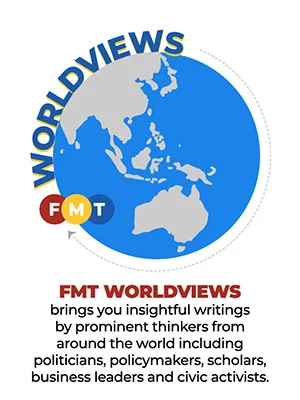
The leader of an authoritarian country with enormous energy reserves builds up his armed forces along the border of a weaker neighbour, one he claims has no right to exist as an independent country.
He then proceeds to launch an invasion, with the goal of swallowing his neighbour and erasing it from the map. The world is faced with the immediate but difficult question of what to do in response.
This is what happened in the summer of 1990, when Saddam Hussein marshalled his military forces on Iraq’s border with Kuwait and, to the surprise of many, launched an all-out invasion. Within days, Iraqi forces took control of the entire country, which Saddam maintained was a province of Iraq.
Now substitute Russian President Vladimir Putin for Saddam, Russia for Iraq, and Ukraine for Kuwait. Everything written above would approximate what took place in February 2022, when Putin gathered Russia’s military along its border with Ukraine, a country whose independence he had rejected in an essay published the previous July, in which he wrote: “I am confident that true sovereignty of Ukraine is possible only in partnership with Russia.”
At issue in both crises was the most basic of all norms influencing international politics: that the borders of sovereign countries ought to be respected and not altered by armed forces.
In both instances, the leader initiating the aggression overestimated his chances of succeeding – and in both instances, much of the world underestimated the threat, thinking it was a bluff until it proved to be anything but.
Diplomacy and economic sanctions fell short of meeting the challenges posed by Iraq and Russia. What was required was military force, and a great deal of it. US leadership also proved essential to reversing aggression in one case and resisting it in the other.
But important differences between the two scenarios highlight just how much the world has changed. Start with Russia. In 1990, bilateral relations between the US and the then-Soviet Union were relatively good, enabling a peaceful end to the Cold War – the sort of outcome that history suggests is anything but automatic. The Soviet Union extended diplomatic support to the US in its effort to resist Iraqi aggression, even though Iraq had long been a close partner.
Today, the Soviet Union is no more, having lost its internal and external empires alike. Russia, its principal successor, has grown angry, resentful, and alienated. It is committing aggression rather than opposing it.
Thirty years ago, the United Nations Security Council condemned Iraqi aggression and authorised not just economic sanctions but also the use of military force against it to liberate Kuwait. Today, the council is sidelined, a result of the permanent veto that Russia holds in the UN’s most important body.
China supported or at least did not block international efforts to oppose Iraq’s aggression. The US-Chinese relationship was much better then than it is now, reflecting Sino-American cooperation against the Soviet Union in the latter decades of the Cold War.
China was also far weaker, with an economy only a small fraction of the size of America’s, and Deng Xiaoping’s dictum of hiding capabilities and biding time still animated China’s diplomatic strategy.
This time around, China declared a no-limits partnership with Russia on the eve of its invasion and has stood by Russia ever since, skirting economic sanctions in the process.
Thirty years ago, the US dispatched half a million soldiers to the Middle East and intervened decisively on Kuwait’s behalf. This time, the US, wary of war after its unsuccessful post-9/11 interventions in Afghanistan and Iraq, and worried about directly confronting a nuclear-armed Russia, has refrained from direct participation in the conflict, limiting its role to providing arms, ammunition, intelligence, and training.
Last time around, the world rallied against aggression. Not now. For one reason or another, many countries are reluctant to oppose Russia. India buys its arms and oil, as do others.
Moreover, America’s ability to rally the world is much diminished, in no small part because respect for the US is much diminished, the result of its internal divisions and widespread global opposition to the US interventions in Iraq in 2003 and in Libya in 2011.
President Joe Biden’s administration didn’t help itself by insisting on framing the war as one of democracy versus authoritarianism. Much of the world is hardly democratic and may have responded more favourably had the US emphasised the threat to a country’s freedom from invasion, which most of the world’s governments do support.
What, then, is to be made of these differences? Geopolitics and great-power rivalry, common throughout history, are back, as is armed conflict between countries. The post-Cold War respite, the holiday from history, is over.
The US remains first among equals (or unequals, to be precise), but that is not to be confused with anything resembling hegemony. The advantages America enjoyed in 1990 have faded as others have gained greater power.
Most important, the gap between the world’s response to aggression then and now is a sobering warning that the international system has deteriorated. The world has become more divided just when it needs unity more than ever to confront common challenges such as infectious diseases, climate change, and emerging technologies like artificial intelligence.
Unity is a scarce resource in international relations. The “international community” is mostly notional. Instead, evidence is mounting that the post-Cold War era has given way to a new era defined more by turbulence and fragmentation than order. The new era may not yet have a name, but the reality is there for all to see. - FMT
 Richard Haass is president of the Council on Foreign Relations.
Richard Haass is president of the Council on Foreign Relations.
The views expressed are those of the writer and do not necessarily reflect those of MMKtT.



No comments:
Post a Comment
Note: Only a member of this blog may post a comment.